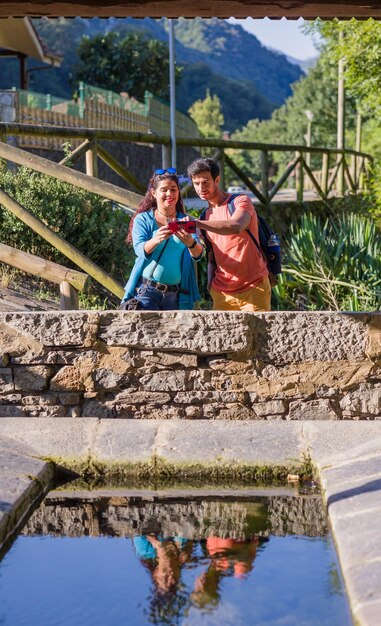Sustainable Tourism Trends & Travel Media: A 2025 Outlook

Sustainable tourism is evolving with trends like regenerative travel, tech integration, and community-focused experiences, presenting new opportunities and responsibilities for travel media to inform and engage audiences.
The intersection of travel and environmental consciousness is no longer a niche concept; it’s a mainstream expectation. This shift presents both opportunities and challenges for the travel industry and, crucially, for travel media. Let’s explore what are the latest trends in sustainable tourism and their implications for travel media, providing a roadmap for navigating this evolving landscape.
Understanding the Core of Sustainable Tourism
Sustainable tourism is more than just a buzzword; it’s a commitment to minimizing the negative impacts of travel while maximizing the positive contributions. This involves considering environmental, social, and economic factors to ensure that tourism benefits both visitors and host communities.
The Three Pillars of Sustainability
At its heart, sustainable tourism rests on three key pillars: environmental protection, social equity, and economic viability. These pillars work together to create a holistic approach to travel that benefits all stakeholders.
- Environmental Preservation: Protecting natural resources, reducing pollution, and conserving biodiversity.
- Social Responsibility: Respecting local cultures, supporting community development, and ensuring fair labor practices.
- Economic Benefit: Generating income for local economies, creating jobs, and promoting sustainable livelihoods.
These pillars are interconnected, requiring a balanced approach to ensure long-term sustainability. Neglecting one pillar can undermine the entire system, leading to unintended consequences and unsustainable practices.

Sustainable tourism requires a collaborative effort from all stakeholders, including travelers, businesses, governments, and local communities. By working together, we can create a more responsible and sustainable future for travel.
Emerging Trends in Sustainable Tourism
The sustainable tourism landscape is constantly evolving, with new trends emerging to address the challenges and opportunities of responsible travel. These trends reflect a growing awareness of the importance of sustainability and a desire to create more meaningful and impactful travel experiences.
Regenerative Travel: Going Beyond Sustainability
Regenerative travel takes sustainable tourism a step further by focusing on actively restoring and enhancing the environments and communities that tourism impacts. It’s about leaving a place better than you found it.
- Focus on Restoration: Actively participating in conservation projects, such as reforestation and habitat restoration.
- Community Empowerment: Supporting local businesses and initiatives that promote community well-being and cultural preservation.
- Educational Travel: Engaging in educational experiences that promote understanding of environmental and social issues.
Regenerative travel invites travelers to become active participants in creating positive change, fostering a deeper connection with the destinations they visit.
Eco-conscious travelers are increasingly seeking accommodations that prioritize sustainability. These hotels and resorts are implementing eco-friendly practices, such as reducing energy consumption, conserving water, and minimizing waste.

Sustainable accommodations often feature locally sourced food, support local communities, and offer educational programs to raise awareness about environmental issues. By choosing these accommodations, travelers can reduce their environmental footprint and contribute to the local economy.
The Role of Technology in Advancing Sustainability
Technology is playing an increasingly important role in advancing sustainable tourism. From reducing carbon emissions to promoting responsible travel choices, technology is helping to create a more sustainable future for the industry.
Smart Travel Apps and Platforms
Smart travel apps and platforms are empowering travelers to make more informed and sustainable choices. These tools provide information on eco-friendly accommodations, transportation options, and activities.
These apps often include features such as carbon footprint calculators, sustainable travel guides, and recommendations for local businesses that prioritize sustainability. By using these tools, travelers can minimize their environmental impact and support responsible tourism practices.
- Carbon Footprint Tracking: Apps that allow travelers to track and offset their carbon emissions.
- Sustainable Travel Guides: Platforms that provide information on eco-friendly accommodations, restaurants, and activities.
- Local Business Recommendations: Apps that highlight local businesses that prioritize sustainability and community engagement.
Challenges and Opportunities for Travel Media
Travel media plays a crucial role in shaping perceptions and influencing travel behavior. As sustainable tourism gains momentum, travel media faces both challenges and opportunities in promoting responsible travel practices.
Highlighting Authentic and Responsible Experiences
Travel media has the power to showcase authentic and responsible travel experiences that benefit both visitors and host communities. This involves highlighting local cultures, supporting community-based tourism initiatives, and promoting ethical travel practices.
By focusing on stories that celebrate cultural diversity, promote environmental stewardship, and empower local communities, travel media can inspire travelers to make more responsible choices.
Travel media can leverage social media platforms to reach a wider audience and promote sustainable tourism practices. This involves creating engaging content that highlights the benefits of responsible travel and encourages travelers to make more informed choices.
Engaging Audiences with Compelling Narratives
To effectively promote sustainable tourism, travel media needs to engage audiences with compelling narratives that resonate with their values and inspire them to take action. This involves telling stories that highlight the positive impacts of responsible travel and showcase the beauty of sustainable destinations.
The Power of Storytelling
Storytelling is a powerful tool for connecting with audiences on an emotional level and inspiring them to embrace sustainable tourism practices. By sharing personal stories of travelers, local communities, and environmental champions, travel media can bring the concept of sustainability to life.
These stories can highlight the transformative power of travel and demonstrate how tourism can be a force for good in the world. By showcasing the positive impacts of responsible travel, travel media can inspire travelers to make more sustainable choices.
Collaborating for a Sustainable Future
Creating a sustainable future for tourism requires collaboration among all stakeholders, including travel media, businesses, governments, and local communities. By working together, we can create a more responsible and equitable tourism industry that benefits everyone.
Travel media can play a key role in fostering collaboration by highlighting successful partnerships and promoting dialogue among stakeholders. This involves facilitating conversations about best practices, sharing innovative solutions, and encouraging collective action.
| Key Aspect | Brief Description |
|---|---|
| 🌱 Regenerative Travel | Focuses on restoring environments and communities impacted by tourism. |
| 🏨 Sustainable Accommodations | Eco-friendly hotels reducing waste and supporting local economies. |
| 📱 Tech Integration | Apps tracking carbon footprints and promoting sustainable choices. |
| 📣 Media’s Role | Highlighting responsible experiences & engaging with compelling narratives. |
Frequently Asked Questions (FAQ)
▼
Regenerative travel goes beyond minimizing negative impacts; it aims to actively restore and improve the environments and communities visited. It’s about leaving a destination better than you found it, versus just maintaining its current state.
▼
Technology offers tools like carbon footprint trackers, sustainable travel guides, and platforms that recommend eco-friendly accommodations and activities. These resources help travelers make informed, environmentally conscious decisions.
▼
Travel media shapes perceptions and influences travel behavior by highlighting authentic, responsible experiences that benefit both visitors and local communities. They can inspire travelers to make ethical and sustainable choices.
▼
Sustainable accommodations include eco-lodges, green hotels, and resorts that implement practices like renewable energy use, water conservation, waste reduction, and support for local communities. They often feature locally sourced food and educational programs.
▼
Collaboration among travel media, businesses, governments, and local communities is crucial for creating a responsible and equitable tourism industry. By working together, stakeholders can share best practices and encourage collective action.
Conclusion
As we look towards the future, the trends in sustainable tourism underscore the critical role of travel media in shaping a more responsible and conscious travel landscape. By embracing these trends and committing to authentic, impactful storytelling, travel media can inspire travelers to make choices that benefit both the planet and its people.





